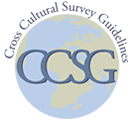- Home
- About Us
- Chapters
- Study Design and Organizational Structure
- Study Management
- Tenders, Bids, and Contracts
- Sample Design
- Questionnaire Design
- Instrument Technical Design
- Translation
- Adaptation
- Pretesting
- Interviewer Recruitment, Selection, and Training
- Data Collection
- Paradata and Other Auxiliary Data
- Data Harmonization
- Data Processing and Statistical Adjustment
- Data Dissemination
- Statistical Analysis
- Survey Quality
- Ethical Considerations
- Resources
- How to Cite
- Help


Appendix A (Funding Sources)
The source and flow of funding impact the structure of a cross-cultural survey. Additionally, the flow of funding or funding structure may change over the course of a study, especially among longstanding studies or programs. Below are examples of how some large-scale, cross-cultural survey programs have been funded. Please see the websites of these programs for further information.
- Some large, cross-cultural studies are European Research Infrastructure Consortiums (ERICs). An ERIC is a specific legal form in Europe between different research groups, established to build and maintain a joint research infrastructure, and is funded by the countries joining the ERIC.
- The [zotpressInText item="{2265844:H9EX7FHA}" format="%a% (%d%)"] became the first ERIC in March 2011, giving it legal personality in all EU Member States and other partner countries of the ERIC, as well as some tax exemptions. SHARE-ERIC was initially hosted by the Netherlands; recently its seat was transferred to Munich, Germany. The project investigates health, socioeconomic status, and social and family networks among adults age 50 and older in over 20 European countries and Israel. Five waves of data collection have taken place beginning in 2004. Austria, Belgium, the Czech Republic, Germany, and the Netherlands are the founding members of SHARE-ERIC, with Switzerland having observer status. Since then, Italy, Greece, Israel, Slovenia, Sweden, and Poland have also become members.
- Following an application to the European Commission, submitted by the UK on behalf of 14 other countries, the [zotpressInText item="{2265844:883WBJP7}" format="%a% (%d%)"] was awarded ERIC status in November, 2013. The ESS is an academically driven cross-national survey that has been conducted every two years across Europe since 2001. The ESS investigates the interaction between Europe's changing institutions and the attitudes, beliefs, and behavior patterns of its diverse populations using face-to-face interviews in over 30 countries throughout four rounds. Before the ESS was awarded ERIC status, it had been funded on a round-by-round basis through the European Commission’s Fifth, Sixth, and Seventh Framework Programmes, the European Science Foundation (ESF), and national funding councils in the participating countries.
- The [zotpressInText item="{2265844:56MZPUKP}" format="%a% (%d%)"] investigates current social science topics in each of its 48 participating countries by collecting self-administered questionnaires. Each survey organization has funded all of its own costs; there are no central funds.
- The [zotpressInText item="{2265844:4BG4NGFS}" format="%a% (%d%)"] investigates social development, with face-to-face interviews in 18 Latin American countries occurring annually since 1995. Initial funding came from the European Commission. There have been several additional funding sources, including: international organizations (e.g., Inter-American Development Bank, United Nations Development Programme, World Bank), government agencies, and private sector sources.
- The [zotpressInText item="{2265844:4PCAI3HD}" format="%a% (%d%)"] aims to gauge public opinion on issues such as political values, democracy, and governance across Asia. The survey network includes research teams from 13 East Asian states and 5 South Asian countries. The ABS (formerly the East Asia Barometer) has received financial support from a variety of agencies and organizations. Since 2003, the ABS has received regular funding from the Institute of Political Science at Academia Sinica. The Program for East Asia Democratic Studies has been co-hosting the project since 2005 under the auspice of the Institute for Advanced Studies in Humanities and Social Sciences at National Taiwan University (NTU). The ABS has also received substantial financial support from the Henry Luce Foundation and the World Bank. In addition, many country teams have secured funding from national and international sources to sponsor their own fieldwork.
- The [zotpressInText item="{2265844:VZGG6HIZ}" format="%a% (%d%)"] was established in 2005 to produce scientifically reliable data on the politically-relevant attitudes of ordinary citizens, to disseminate and apply survey findings in order to contribute to political reform, and to strengthen institutional capacity for public opinion research. In 2010–11, surveys were conducted in 11 Arab countries with funding provided by the United Nations Development Programme, the International Development Research Council of Canada, and the United States Institute of Peace.
- The [zotpressInText item="{2265844:Y3GGKRR2}" format="%a% (%d%)"] is an independent, nonpartisan research project that measures the social, political, and economic atmosphere in Africa. Afrobarometer surveys are conducted in 35 African countries and are repeated on a regular cycle. Core donors for Afrobarometer Rounds 5 and 6 include the Mo Ibrahim Foundation, the Swedish International Development Cooperation Agency, the Department for International Development (United Kingdom), the United States Agency for International Development, the World Bank, the Institute for Security Studies (South Africa), the United States Institute of Peace, Transparency International, and the Bill and Melinda Gates Foundation.
- The [zotpressInText item="{2265844:76RFYK67}" format="%a% (%d%)"] investigate mental disorders with face-to-face interviews in 28 countries since 2000. The World Mental Health Survey Initiative is supported by the National Institute of Mental Health, the John D. and Catherine T. MacArthur Foundation, the Pfizer Foundation, the U.S. Public Health Service, the Fogarty International Center, the Pan American Health Organization, Eli Lilly and Company, Ortho-McNeil Pharmaceutical, GlaxoSmithKline, and Bristol- Myers Squibb. In addition, each participating country has had its own sources of funding.